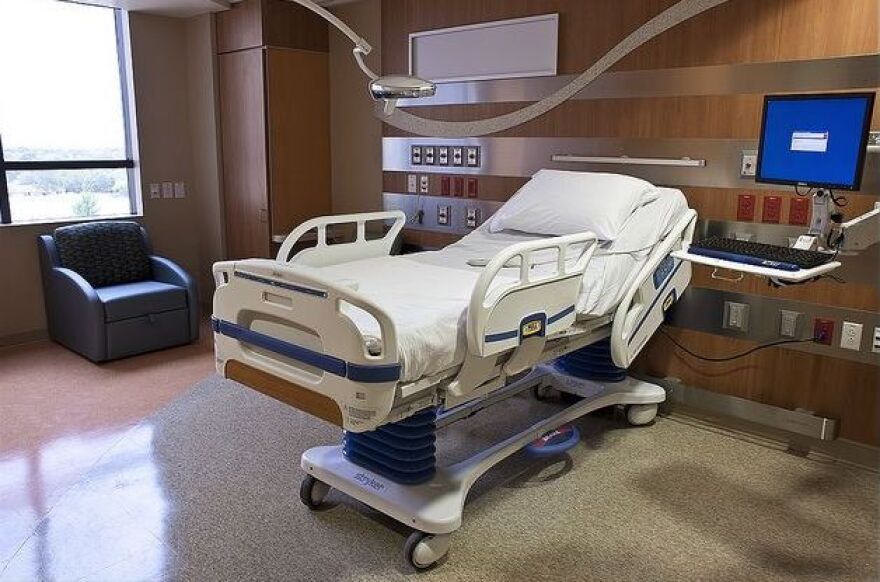As COVID-19 cases in New Mexico continue to rise, local intensive care units have had to quickly adjust to treating patients who come down with severe symptoms of the virus. Your New Mexico Government recently spoke with John Morgan, an ICU nurse at Presbyterian Hospital in Albuquerque, about what it’s like to be on the frontlines treating critical COVID-19 patients and what he wants people calling for the stay-at-home order to be lifted right now to know.
JOHN MORGAN: We actually have a unit right now which is entirely isolated and they have sort of people whose needs are at different levels of support. I work with the ones who are probably the most critical.
KUNM: What does that support entail?
MORGAN: At our point, they've been intubated, or we're trying to keep them from being intubated and they're fairly close. So, basically what it means is they get placed on a ventilator, and if their body has gone septic – which is kind of like if they get a secondary infection, which begins to kind of crash their body – we frequently have to give them medications to keep their blood pressure up. That degree of support isn't unheard of, like we see that in a lot of patients with lung injury, or like in the case of an influenza patient. The biggest difference we've noticed is usually they go from like zero to 60. They're like needing a little bit of oxygen on the floor and suddenly a little is not enough and they need a huge amount very suddenly. And they're also exceptionally hard to wean off the ventilator. For most cases, we go in, we support for a few days, and then we can begin to kind of wean back and wean back and wean back. And that's probably part of the reason why it's been such a hard thing for cases like New York where they have so many people. Like, it isn't just that they're on the ventilator, it's the fact that they're very hard to get off the ventilator. So, you need more and more and more.
KUNM: How is this pandemic affecting the treatment of other patients? If someone comes in with appendicitis or something, how is it affecting the treatment?
MORGAN: You know, honestly, we have kind of different areas right now. We've ended up separating our units out. There's like three different areas. One is patients who are in no way shape or form infected, patients who are infected who end up in sort of a lockdown area, and then that time where we're kind of waiting on results of the test to see, you know, are they truly positive or are they negative? I think that's been one of the harder elements of it because you also don't want to get anybody else infected if they are positive.
KUNM: What type of concerns do you have, in general?
MORGAN: You know, obviously, we're all very careful about protecting ourselves, protecting our colleagues, protecting the other patients. In terms of the question: at the moment, we're still within capacity. But, if we get enough people, will be beyond our capacity and we'll be pushed pretty hard if it ends up in that place.
KUNM: Do you feel like the hospital is supporting you all?
MORGAN: Yes, very much so, very much so. It's a hard thing, though. This is a system that had to change enormously in a very short amount of time. I definitely feel that my employer has been stepping up and doing the best he can. But definitely, there were days at the beginning where you're like, 'is this going fast enough? Is it not going fast enough?'
KUNM: You know, there's a lot of people who want the shutdown to end right now. Be it they want to get back to work, be it that they feel like they want to get back to their personal freedoms. Being someone who's on the frontlines dealing with this every time you go to work, what do you want those people to know?
MORGAN: I think it's very important to remember that one of the reasons we're working currently in our capacity is the fact that the social distancing is actually helping. Is it curing everyone? No. What it is providing is that they are coming in at a rate that we can currently handle. If this was allowed to kind of open the floodgates, I think we probably would be swamped.
Something I've noticed in my job, not related to this, is that people who have not been sick before sometimes associate it with elements that are probably not true. There's this idea of like, 'I've never been sick before, it must be because I'm very healthy', or because, 'I don't live like these other people who got sick, so they must have an unhealthy lifestyle'. I mean, some people have even said to me, 'but I'm a good person', as if it was some sort of moral judgment. But the truth is, illness is not a method of judgment. Illness is not a method of justice. The fact is, it comes to all of us. Yes, a lot of the cases we have are people who are older or who have comorbidities, but that is not 100% by any means.
KUNM: Is there anything you wish your patients were doing that they aren't?
MORGAN: No, I don't really think it works like that, honestly. I think a lot of my patients are people who had come to the knowledge of this thing kind of late. So, caution is definitely important. And just because you don't feel ill doesn't mean that other people can't be infected or that you can't be a carrier. So, it's important to keep that in mind.
*****
Your New Mexico Government is a collaboration between KUNM, New Mexico PBS and the Santa Fe Reporter.
Edited by KUNM's Nash Jones.






